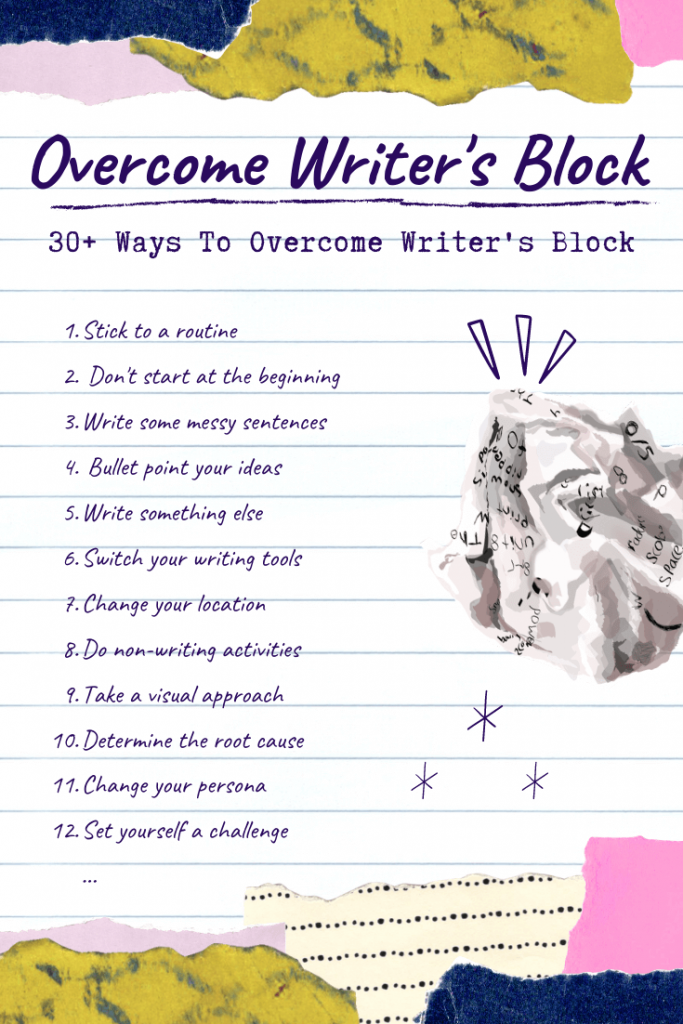30 Ways To Overcome Writer’s Block
Everyone struggles with writer’s block from time to time. The hardest part is when you have a tight deadline looming on you, and all you have is a blank paper staring back at you. Writer’s block is every writer’s nightmare. The good news is that we have found over 30 proven ways to overcome writer’s block and to help you get back on track with your writing.
What is Writer’s Block?
The dictionary definition of writer’s block is that it is a condition where you are unable to think of what to write or how to write it down (Cambridge Dictionary). Whether you’re writing an essay for school or a creative piece for pleasure, writer’s block can happen at any time. There are, of course, some scenarios that make writer’s block worse. One example is when you have just thought of a really cool idea, but it isn’t fully formed yet. When an idea isn’t completely clear, it can make it really hard for you to write it down on paper. This is where writer’s block comes in and makes life harder for you!
Another scenario is when you want everything to be perfect before you write it down. When you focus on perfection too much, it’s near impossible to write anything down. You need the opening line to be perfect, character names, setting and so on. All these details can be overwhelming especially when you’re aiming for perfection. That’s why it’s always important to remember that your story can have many drafts and versions of it. You don’t have to hit publish on the very first draft of your story – keep editing it until you’re happy with it!
So, how do we overcome writer’s block and get our writing back on track? It’s actually not that difficult at all. Especially with these 30 techniques for overcoming writer’s block.
Check out this master list of 105 creative writing exercises to help you beat writer’s block for good!
Dealing With Writer’s Block in 30 Ways
Here are 30 ways to get around writer’s block and beat it:
- Stick to a routine: Create a writing routine for yourself. This means that you should ideally set aside some time every day to focus on your writing. You don’t have to write a long essay every day. Short pieces of poetry or a funny little story will do. Just develop a writing routine and stick to it. And soon your mind will be ready and charged to start writing some real stuff down.
- Don’t start at the beginning: The beginning can be boring. Especially when you just thought of a really cool fight scene that you can write about. One way to keep your writing moving along is to start with the cool scenes first. The scenes that you’’ enjoy writing about. Then you can deal with the boring parts of the story another day when you feel more in the mood to write.
- Write some messy words: Achieve the opposite of perfection. Don’t worry about spelling, grammar or whether a sentence makes sense or not. Just get some words down – Even if it’s a load of gibberish. You can worry about making sense of them later on.
- Use bullet points: You just had the greatest idea ever. Instead of trying to write the whole story down, quickly jot down the main points of this idea. Develop your idea and plan it out any way you like. Then when it comes to writing your story or novel, you’ll have a better understanding of it.
- Write something else: You might not feel like continuing that short story about cats. But that doesn’t mean you can’t write at all. Try writing something else entirely like a haiku or starting a new short story about dinosaurs instead. After a while, you might be in the mood to continue writing that cat story that you left for a while.
- Switch your writing tools: Switching your writing tools can be a great way to ignite your writing again. If you’ve been using a pen and paper for too long, try switching to a word document on your computer. Alternatively, you might want to use a specialised writing tool like Imagine Forest to bring back the fun in writing!
- Change your location: Writing for hours or days in your bedroom can get a little tiring and stuffy. Try switching up your writing location when you’re getting frustrated. For example go write in your kitchen, your garden or even at the park. Changing writing locations can bring back life to your writing and help you deal with writer’s block.
- Do non-writing activities: Writing can start feeling like a chore when you write for too long. It’s a good idea to balance your writing with some non-writing activities, like playing sports, cooking, going out, listening to music and so forth. After taking a well-earned break from writing you should feel more enthusiastic when you come back.
- Take a visual approach: Words, words and more words. It can be tiresome looking at letters and words all day long. Break the cycle by drawing out your scenes, creating brainstorms or sketching out your characters. Storyboarding can also be a great visual activity for writers.
- Determine the root cause: Think about why you have writer’s block in the first place. Some common reasons include lack of inspiration, feeling tired, not knowing how to develop your story or just feeling pressure from other writers. Write your feelings and concerns down on a piece of paper. And then think of possible ways to fix these problems. For example, if you feel tired, then you might want to take a break from your writing. Alternatively, if it’s a lack of inspiration, then focus on finding inspiration through writing prompts or these activities on how to come up with ideas.
- Change your persona: Instead of writing like yourself, imagine how it would be to write if you were a famous writer like Dr. Seuss or Roald Dahl. If being another writer is difficult, then pretend to be another famous character or celebrity. If you were Elsa from Frozen, how would she write a story? What words would she use and what would she write about? This activity is a great way to overcome writer’s block in kids or young writers especially.
- Set yourself a challenge: After a while, writing can almost feel like a chore that you just have to do. But don’t let this become a blocker for your writing. Keep writing fun by setting yourself daily writing challenges and exercises. For example, aim to include a certain word or phase in your next story or make sure that you include a famous quote somewhere. Alternatively, you must just want to set yourself daily word count goals, where you aim to write a certain amount each day, such as 100 words a day or 500 words in a week.
- Mix ideas from a range of places: Sometimes, wanting to be unique and original can cause writer’s block. In this case, why not take a bunch of ideas that already exist and mix them up to create a mega story. Take stuff from a YouTube video you recently saw and mix it up with something that happened to you in real-life to create a funny story that can end up being a masterpiece.
- Eliminate Distractions: Get rid of the internet, mobile phones, and any TV shows playing in the background and focus entirely on your writing. All you really need is a pen, paper and your fully focused mind to start writing.
- Create a writing space: Writing on your bed or on the floor can be uncomfortable and distracting. It’s important to have a dedicated writing space somewhere in your house, like an office or a desk in your bedroom, where you can sit comfortably with all your writing materials in one place. Not only does this make it easy when you need something like your ideas journal or notebooks, but it’s also a good way to get rid of distractions.
- Read a book: When you’re stuck on how to write a story or on getting ideas, reading a book is possibly the best idea to get rid of this type of writer’s block. Reading not only expands your vocabulary but also helps you understand how real books are written and laid out. Helping you to become a better writer.
- Join a writing community: Write with others, share your ideas and work together to become better writers. Writing communities like Imagine Forest, are a great way to test your story ideas, get feedback and talk to other writers about your struggles.
- Sleep on it: Good sleep is important for many activities including writing. When you’re tired your brain loses focus, making writing even more difficult than it has to be. A good night’s sleep is always recommended if you’re feeling tired or not in the mood to write.
- Get some fresh air: Go out for a walk and get your mind off the writing. Stretch your legs and do a little work-out to get the blood pumping. You should feel refreshed and ready to start writing again when you return.
- Let your mind takeover: Forget writing your story and write down your thoughts at the moment. Are you feeling angry, upset, or bored? Write it down and keep writing it down until you feel some inspiration or motivation to write your story again.
- Deny the writer’s block: Some writers believe that writer’s block is a myth. Whether it’s a real condition or not, it doesn’t matter. The point is that denying the writer’s block can be a good motivation to start writing again. Just remember, there’s always something to write about. You can rewrite, free write, write from different perspectives, write poems, sentences, funny words and anything else you like. With so much to write about – Is there really such a thing as writer’s block?
- Do other creative activities: Step away from writing and do something else creative. You can make your own finger puppets, do some papercraft, paint a picture, draw something, keep a bullet journal – Anything to get those creative juices flowing again. Eventually, you’ll be able to beat writer’s block and get writing again.
- Write early in the morning: Your brain is just waking up, probably from a dream. That’s normally the perfect time for inspiration to strike. Keep a notebook handy by your bed and start writing as soon as you wake up or even in the middle of the night if you can’t sleep.
- Do some research: Sometimes with writer’s block, the problem is not the writing but it’s the research. You either don’t know much about your idea or about something in your story, such as the setting or characters. Try researching the year your story is set in or stories that are similar to your idea and making notes. This activity is really handy in developing your story and making sure that you’re headed in the right direction.
- Make a list: The worst thing about writer’s block is that you feel that valuable time is being wasted. Make your time matter by creating a list of things to do or research. A good technique is to break the task of writing a story down into loads of mini-tasks to complete within deadlines. For example, writing the opening line, researching settings, creating character backstories, developing a plot twist and so on.
- Keep an ideas journal: Create a “Go-To” journal or folder with all your ideas, writing prompts, quotes and inspirational material in one place. Whenever you don’t feel like writing or have lost inspiration, you can look through your personal ideas journal for the help you need.
- Participate in Contests: Contests or online writing challenges are a great way to give you some structure when it comes to writing. They can also offer inspiration and motivation in the form of a deadline.
- Set a Timer: Set a timer for about 15 to 20 minutes and then write non-stop everything that comes to mind. After the time is up, take a break for 2 minutes and set another time for 15 to 20 minutes. After three or four sessions you should feel more inspired and ready to write something more important.
- Re-read your old pieces of writing: Look through your old pieces of writing and stories. Take note of all the things you liked about these pieces and all the things you would improve. You could even try re-writing one of your old pieces and making it better by improving on all the things you disliked about it.
- Write to your friend: Forget writing a story for the mass market or a wide audience. The pressure can be too much. Instead, think about a close friend or a family member and write a story just for them. Think about what they would enjoy reading, what makes them laugh and create a story dedicated to them.
- Follow your passions: Write about something you really enjoy doing or something you really care about. Do you care about global warming, crime, and animal rights? Use this passion and put it into your stories. Remember, writing gives you the opportunity to change the world and make a difference. It’s more than just a few words on a paper, you could impact millions of lives.
There’s no magic cure to writer’s block. In the end, you’ll have to find your own way of dealing with writer’s block and finding ways to motivate yourself. Let us know your techniques on how to overcome writer’s block in the comments below.






Comments loading...